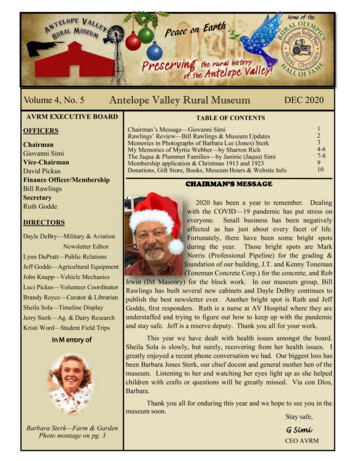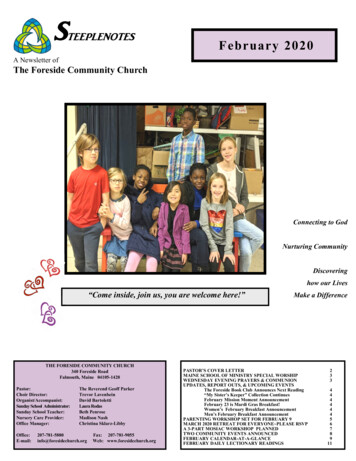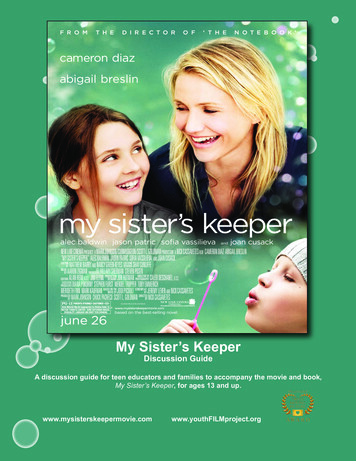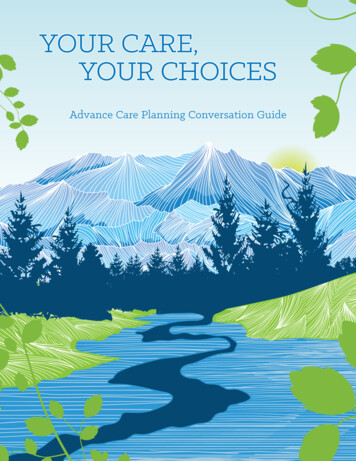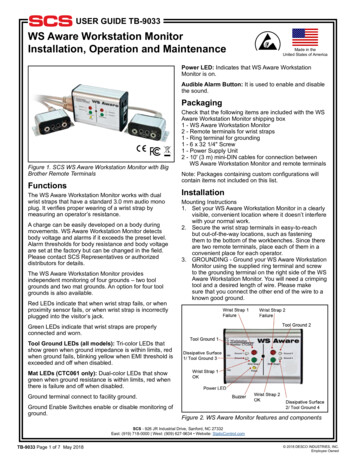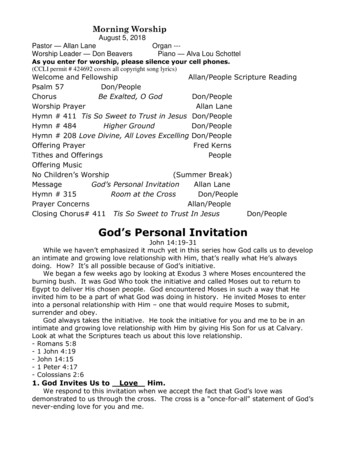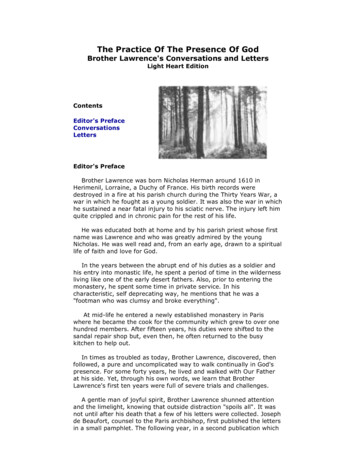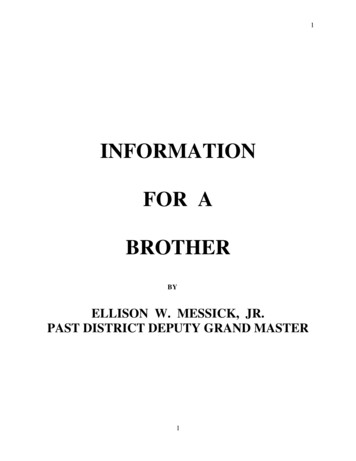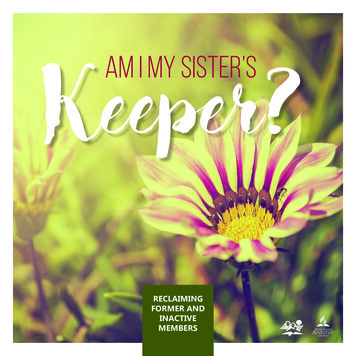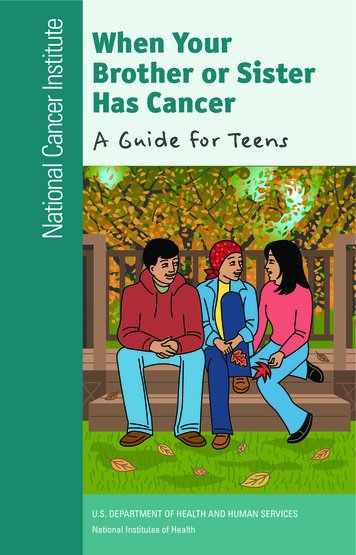
Transcription
National Cancer InstituteWhen YourBrother or SisterHas CancerA Guide for TeensU.S. DEPARTMENT OF HEALTH AND HUMAN SERVICESNational Institutes of Health
If your brother or sister hascancer, this booklet is for you.In this booklet you will:National Cancer InstituteThis Booklet IsFor You.When YourBrother or SisterHas CancerA Guide for Teens Hear from other teenswho—like you—havea brother or sisterwith cancer Find out what has helpedthem Get ideas about peopleto talk with when you’reupset or feel all aloneU.S. DEPARTMENT OF HEALTH AND HUMAN SERVICESNational Institutes of Health Learn a little about cancer and how it’s treated.This booklet can’t give you all the answers, but it can help youprepare for some of the things you might face.There is a team of people working hard to help your brother orsister get better. You should know that there are also many peopleavailable to help you. No one should go through this alone.Free copies of this booklet are available from the NationalCancer Institute (NCI). To learn more about cancer or torequest this booklet, visit NCI's Web site (www.cancer.gov).You can also call NCI's Cancer Information Service at1 800 4 CANCER (1 800 422 6237) to order the bookletor talk with an information specialist.1
How To Use This BookletYou may want to read the booklet from cover to cover. Or maybeyou’ll just read those sections that interest you most. Someteens pull out the booklet now and again when they need it.You may want to share this booklet with others in your family.It might help you bring up something that has been on yourmind. You could ask people in your family to read a certainchapter and then talk about it together.We’ve put words that may be new to you in bold. Turn to theglossar y at the end of this booklet for their def initions.Wherever you go,go with all your heart.—Confucius2
Table of ContentsThis Booklet Is for Youpage 1CHAPTER 1You’ve Just Learned ThatYour Brother or Sister Has Cancerpage 5CHAPTER 2Learning About Cancerpage 15CHAPTER 3Cancer Treatmentpage 19Is thereCHAPTER 4Becoming a Stem Cell DonoranythingI can do tohelp you out?page 31CHAPTER 5What Your Brother or SisterMay Be Feelingpage 37tell mewhat’s going on.CHAPTER 6Changes in Your Familypage 41CHAPTER 7How You Can HelpYour Brother or Sisterpage 513
CHAPTER 8Taking Care of Yourselfpage 55CHAPTER 9You and Your Friendspage 65C H A P T E R 10Finding Supportpage 71Talking about what’sgoing on is hard. I knowit’s not easy to askquestions, but is thereanything you want toC H A P T E R 11After Treatmentpage 77C H A P T E R 12The Road Aheadpage 85C H A P T E R 13Learning More on Your Ownpage 89CHART AMonitoring Testspage 92CHART BCancer Team Memberspage 94Glossarypage 954talk about or know?
Chapter 1You’ve Just Learned That YourBrother or Sister Has CancerYou’ve just learned thatyour brother or sister hascancer. You may have a lotof emotions—feelingnumb, afraid, lonely, orangry. One thing iscer tain—you don’tfeel good.For now,try to focuson these facts:“This is so unreal. I thoughtonly old people got really sick—not little kids. My brotherJason has cancer, and he is only10 years old. We found out lastweek, and it hasn’t even sunk inyet. I wake up every morningthinking this is just a bad dream.”—Liza, age 15 Many kids survivecancer. You have good reason to be hopeful that your brotheror sister will get better. Today, as many as 8 in 10 kidsdiagnosed with cancer survive their illness. Many go on tolive normal lives. That’s because scientists are discoveringnew and better ways to f ind and treat cancer. You’re not alone. Right now it might seem like no one else inthe world feels the way you do. In a way you’re right. No onecan feel exactly like you do. But it might help to know thatthere are other kids who have a brother or sister with cancer.Talking to others may help you sort out your feelings.Remember, you are not alone.5
You’re not to blame. Cancer is a disease with many causes,many of which doctors don’t fully understand. But yourbrother or sister did not get cancer because of anything youdid, thought, or said. You can’t protect, but you can give comfort. Sometimesyou’ll be strong for your brother or sister, and sometimesyour brother or sister will be strong for you. It’s okay to talkabout how hard it is and even cry together. Knowledge is power. It can help to learn more about cancerand cancer treatments. Sometimes what you imagine isactually worse than the reality.hey,checkthis out.The gem cannot be polished without friction,nor man perfected without trials.—Chinese proverb6
Your FeelingsAs you deal with your sibling’s cancer, you may feel lots of differentemotions. Some of the emotions you may feel are listed below.ScaredCheck off all the feelings you have today: My world is falling apart. I’m afraid that my brother or sister might die. I’m afraid that someone else in my family might catchcancer. (They can’t.)I feel scared because:GuiltyIt’s normal to feel scared. Some of your fears may be real. Othersmay be based on things that won’t happen. And some fears maylessen over time. I feel guilty because I’m healthy and my brother or sisteris sick. I feel guilty when I laugh and have fun.I feel guilty because:You might feel guilty about having fun when your sibling is sick.This shows how much you care about them. But you should knowthat it is both okay and important for you to do things that makeyou happy.7
Angry I am mad that my brother or sister is sick. I am angry at God for letting thishappen. I am angry at myself for feeling theway I do. I am mad because I have to do all the chores now.I am angry because:Anger of ten covers up other feelings that are harder to show.If having cancer in your family means that you can’t do what youlike to do and go where you used to go, it can be hard. Even if youunderstand why it’s happening, you don’t have to like it. But,don’t let anger build up inside. Try to let it out. And when you getmad, remember that it doesn’tmean you’re a badel mad atperson or you don’t“Sometimes, I fehaving cancer.love your sibling. Itmy brother forot right,just meansI know that’s n. But ityou’re mad.he can’t help itanderything.has changed evd don’t talkMy mom and dabut him,about anythings anyoneand neither doeot fair.”else. It’s just n—Tyree, age 138
Neglectedy parents go“ At night both mto talkin my sister’ s ro omI’ m theand be with her.ed them,youngest, and I nehave to beto o. Do they bothht?”with her every nig— Sarah, age 14 I feel lef t out. I don’t get any attention any more. No one ever tells me what’s going on. My family never talks anymore.I feel neglected because:When your brother or sister has cancer, it’s common for thefamily’s focus to change. Your parents don’t mean for you to feellef t out. It just happens because so much is going on. You maywant to tell your parents how you feel and what you think mighthelp. Tr y to remember that you are important and loved and thatyou deserve to feel that way, even though you might not get asmuch attention from your parents right now.9
Lonely My friends don’t come over anymore. My friends don’t seem to know what to say to me anymore. I miss being with my brother or sisterthe way we used to be.I feel lonely because:EmbarrassedWe look at some things that may help you deal with changes infriendships in Chapter 9, and at things others have done to stayclose to their siblings in Chapter 7. For now, try to remember thatthese feelings won’t last forever. I’m sometimes embarrassed to be out in public with mysibling because of how they look. I feel silly when I don’t know how toanswer people’s questions.I feel embarrassed because:It can help to know that other teens also feel embarrassed. So dotheir siblings. In time it gets easier, and you will f ind yourselffeeling more comfortable.10
Jealous I’m feeling upset that my brother orsister is getting all the attention.I feel jealous because:Even if you understand why you are getting less attention, it’sstill not easy. Others who have a brother or sister with cancerhave felt the same way. Try to share your feelings with yourparents and talk about what you think might help.What You’re Feeling Is NormalThere is no one “right” way to feel. And you’re not alone—many other teens in your situation have felt the same way.Some have said that having a brother or sister with cancerchanges the way they look at things in life. Some even saidthat it made them stronger.r.big sisteymrofbade used toh“I feel soS.eimtk all theand now,She’s sicotpudeene I lookNow, shbe the o.degnag has cheI feel likeverythin.troppume for sfast.”looks tow up soorgotgI’m havinage 12—Riley,11
Dealing With Your FeelingsA lot of people are uncomfortable sharing their feelings. Theyignore them and hope they’ll go away. Others choose to actcheerful when they’re really not. They think that by acting upbeatthey won’t feel sad or angry anymore. This may help for awhile,but not over the long run. Actually, holding your feelings insidecan keep you from getting the help that you need.Try these tips: Talk with family and fr iends that you feel close to. You owe itto yourself. Write your thoughts down in a journal. Join a support group to meet other kids who are facingsome of the same things you are. Or meet with a counselor.We’ll learn more about these options in Chapter 10.It is probably hard to imagine right now, but, if you let yourself,you can grow stronger as a person through this experience.can wetalk?12it’s areliefto talkabout allthis stuff.
When you come to the end of your rope,ein to d o th’s a pa“ Ita ll th ey m y se lfbeshd ise g ot si ckor e hm e. B eftibjo’sery b ro thw a s mity jo b tond mto w a sh a.”a syst em. W e h a drydn , a g e 17J us ti—tie a knot and hang on. —Franklin D. Roosevelt“ When my dad cofrom being with mmes homethe hospital all da y sister atOne day I just asky, he is so grumpy.always se emed so ed him why hegot quiet and said mad at me. Heand stressed that he’ s so worriedset him off . . . a even little thingsedge isn’ t fair to nd that being onsister. Hearing w me and my otherinside my dad’ s hehat was going onrealize how tough ad made meis for him, to o. this whole situationlot closer to him, It made me fe el aand mad.” — Kevin instead of so alone, age 15“I had togive up goingto drill team afterschoolbecause Ihad to be hometo take care of my littlesisters while MomtookJay to the doctors.”—Becky,age 1613
“I was so scared when I found outthat my brother had cancer. Inthe movies cancer always seems soterrible. Then I realized that Ididn’t really know that muchabout cancer. I started readingand learned a lot. I found outthat most kids survive cancer.”—Rashid, age 1414
Chapter 2Learning About CancerLearning about cancer and your brother’s or sister’s treatmentcan help you feel less afraid. Some of what you have seen orheard about cancer may not apply. Most people feel better whenthey know what to expect.Here are a few facts to remember: Nothing you did, thought, or said caused yourbrother or sister to get cancer. You can’t catch cancer from anotherperson.TFA CS Scientists are f inding many new andbetterways toat Chrissy onedamllyareotg“If ind andlet me ride hertn’ldouweShy.datreatsaid, ‘ I wishndadamotgI.bikecancer.e has Most kidssurvivecancer.ow shyou were dead.’ N maybe it wasleukemia. I thoughtared to tellmy fault. I was scen they’ d allanyone because th nd be mad.know what I did a me crying oneBut my dad heard to talk to him.night, and got me my fault orHe said it wasn’ t rissy has cancer.”anybody’ s that Ch— Katie, age 1315
Experience is what you get by not having it when you need it. —Anonymous16What Is Cancer?FA CTSDoctors have found more than 100 dif ferent typesof cancer. Cancer is a group of many relateddiseases that begin in cells, the body’s basic unit oflife. To understand cancer, it’s helpful to know what happenswhen normal cells become cancer cells.Normally, cells grow and divide to make more cells only when thebody needs them. This orderly process helps to keep the bodyhealthy. Sometimes, however, cells keep dividing when new cellsaren’t needed. These extra cells form a mass of tissue, called agrowth or tumor. Tumors can be benign or malignant: Benign tumors aren’t cancerous. They can of ten beremoved and don’t spread to other parts of the body. Malignant tumors are cancerous. Cells in these tumorsare abnormal and divide and grow without control or order.They can invade and damage nearby tissues and spread toorgans in other par ts of the body. The spread of cancer fromone par t of the body to another is called metastasis.normal cellsabnormal cells
Most cancers are named for the organ or type of cell in which theybegin. For example, cancer that begins in the bone is called bonecancer. Some cancers do not form a tumor. For example,leukemia, which is the most common cancer among children, is acancer of the bone marrow and blood.Why Do Children Get Cancer?The causes of most cancers aren’t known. Canceramong children does not happen that of ten. Scientistsare still tr ying to learn more about why some kids getcancer and others don’t.FA CTWill I Get Cancer, Too?If you are worried that you may get cancer, you should know thatmost cancers don’t run in families. You and your parents can talkto a doctor for more information.Can Doctors Cure Cancer?Every year scientists discover better ways to treat cancer. Thatmeans many people are successfully treated for cancer. However,doctors are careful not to use the word “cure” until a patientremains free of cancer for several years. Cancer treatment maycause a remission, which means that the doctor can’t f ind signsof cancer. But sometimes the cancer comes back. This is called arelapse or recurrence. Whether your brother or sister will becured of cancer depends on many things. No booklet can tell youexactly what to expect. It is better to talk with your parents andyour sibling’s doctor or nurse.17
Where to go for more informationTo learn more about the type of cancer your brother or sisterhas, visit the National Cancer Institute’s (NCI) Web site(www.cancer.gov). You can also call NCI’s CancerInformation Service at 1 800 4 CANCER (1 800 422 6237)to talk with an information specialist. All calls are free andconf idential.He who is not everydayconquering some fearhas not learnedthe secret of life.—Ralph Waldo Emerson18
Chapter 3CancerTreatment“Rachel had all this beautiful hair.But during treatment, she’d wakeup and find hairall over herpillow. It would alsofall out whenshe combed or washed it. I couldhear her cryingin the bathroom.One day Mom helped her shaveher head. Then we bought anddecorated some bandanastogether. They look good onher. My sister ismy hero.”—Lauren, age 12You may want to knowwhat to expect duringyour brother’s orsister’s cancertreatment.This chapter brieflyexplains dif ferenttreatments. It talksabout how they workand their sideeffects. You willprobably have morequestions af terreading this chapter.It may help to talk with yourparents. Or ask if you can talkwith your sibling’s nurse orsocial worker.19
How Does Treatment Work?Cancer treatment aims to get rid of cancer cells. The type oftreatment your brother or sister will be given depends on: The type of cancer Whether the cancer has spread Your sibling’s age and general health Your sibling’s medical histor y Whether the cancer is newly diagnosed or has recurred.Remember that there are more than 100 dif ferent types of cancer,and each type is treated dif ferently.Treatment follows a protocol, which is a treatment plan. But evenif two people have the same type of cancer and the sametreatment plan, it may not work the same way for both of them.This is because people’s bodies can react dif ferently to treatment.Most children with cancer are treated at large pediatric cancercenters in clinical trials. A clinical trial is a study that helps showhow, for example, a promising anticancer drug, a new test, or apossible way to prevent cancer af fects the people who receive it.20
What Are Treatment Side Effects?Side ef fects happen because the cancer treatment targets fast growing cells. Cancer cells are fast growing, but so are normalcells like the ones in the digestive tract and hair, for example.The treatment can’t tell the dif ference between fast growingnormal cells and fast growing cancer cells. That’s why peoplesometimes get sick to their stomach and lose their hair when theyhave chemotherapy (one type of cancer treatment).Some side ef fects, like feeling sick to the stomach, go awayshortly af ter treatment, while others, like feeling tired, may last awhile af ter treatment has ended.Write down what treatment your brother or sister will get:Use the chart on the next two pages to f ind out more aboutdif ferent types of cancer treatment.The chart describes six types of cancer treatment, how they’redone, and some of the side ef fects. Your brother or sister mayget one or more of these treatments. Depending on the exacttreatment, they may visit the doctor during the day, or theymay stay overnight in the hospital.21
T R E AT M E N T C H A RTTreatmentWhat is it?SurgeryThe removalA surgeonof all or part of operates toa solid tumorremove thecancer. Drugs areused so that thepatient is asleepduring surgery. Pain after thesurgery Feeling tired Other side effects,depending on thearea of the bodyand the extent ofthe operation.The use ofhigh energyrays orhigh energyparticles to killcancer cellsand shrinktumorsRadiation maycome from amachine outsidethe body or fromradioactivematerial placed inthe body near thecancer cells. Feeling tired Red or blisteredskin Other sideeffects,depending onthe area of thebody and thedose ofradiation.The use ofmedicine todestroycancer cellsThe medicine canbe given as pills,through aninjection (shot), orthrough anintravenous (IV)line. It is oftengiven in cyclesthat alternatebetween treatmentand rest periods. Feeling sick tothe stomach orthrowing up Loose bowelmovements or notbeing able to goto the bathroom Hair loss Feeling verytired Mouth sores A feeling ofnumbness,tingling, orburning in thehands and feet.Also called anoperationRadiationtherapyAlso calledradiotherapyChemotherapyAlso calledchemo22How is it done?What mayhappen as aresult?(side effects)
T R E AT M E N T C H A RT (continued )TreatmentWhat is it?How is it done?Stem cellThe use oftransplantation stem cellsCan be a bonemarrowtransplantation(BMT) or aperipheral bloodstem celltransplantation(PBSCT)Stem celltransplantationfound in either uses stem cellsfrom the patient orthe bonemarrow or the from donors. Inmany cases, theblood. Thisdonors are familyrepairs stemcells that were members. Thepatient gets thesedestroyed byhigh doses of stem cells throughchemo and/or an IV line.radiationtherapy.What mayhappen as aresult?(side effects) The side effectscan be much likethose fromchemo andradiation. Insome cases, theside effects maybe worse.HormonetherapyA treatmentthat adds,blocks, orremoveshormonesfrom the body.Hormonetherapy isespeciallyuseful to slowor stop thegrowth ofsome types ofcancers.Hormone therapycan be given as apill, through aninjection, orthrough a patchworn on the skin.Sometimessurgery is neededto remove theglands that makespecific hormones. BiologicaltherapyBiologicaltherapy usesthe body’sown defensesystem (theimmunesystem) tofight cancercells.Patients may begiven medicine inpills, through aninjection, orthrough an IV line. Also calledimmunotherapyFeeling hotFeeling tiredWeight changesMood changes.Chills/feverMuscle achesWeaknessFeeling sick tothe stomach orthrowing up Loose bowelmovements.Your brother or sister will get tests to monitor the cancer and howthe treatment is working. See Chart A in the back of this bookletfor a list of some common monitoring tests.23
However long the night, the dawn will break.” —African proverbThings To Look ForSome treatments may make your brother or sister more likely toget an infection. This happens because cancer treatment canaf fect the white blood cells, which are the cells that f ightinfection. An infection can make your brother or sister sicker. Soyour sibling may need to stay away from crowded places or peoplewho have an illness that he or she could catch (such as a cold, theflu, or chicken pox).Because of this, you may need to: Wash your hands with soap and water of ten to keep fromspreading germs Tell a parent when you’ve been around someone who’s sickor has a cold Stay away from your brother or sister if you get sick.The WaitingIt’s hard to wait to see how well the treatment will work. Yourbrother’s or sister’s doctor may tr y one treatment, then another.One day your brother or sister may feel a lot better, and the nextday or week they may feel sick again. Treatment can go on formonths or sometimes years. This emotional roller coaster is hardon everyone.Dur ing this time, remember that the treatment is working to stopthe cancer and make your brother or sister better. For moreinformation about the people who will be treating your brotheror sister, see Chart B in the back of this booklet.24
Want To Visit?Close to homeIf your brother or sister is in a hospital near you,you may be able to visit.Learn ahead of time“ I looked forward to thehow your sibling istimes I got to visit my bigdoing and what tosister when she was in theexpect. You can readhospital. Sometimes it wastogether, draw, playreally sad to see Tara in bedgames, or sit and talk.because she looked so weak.Some teens also wantBut I am glad I went. Nowto help care for theirbrother or sister. Askmy sister is home, so I get tothe nurse what you cansee her again.” —Allie, age 14do if you are interested.Far from homeWhen your brother or sister is getting treatment far from home,you may not be able to visit them as of ten. It will help you bothto stay in touch. Talk on the phone. You can also send cards,letters, or picturesback and forth.25
Your Own Ups and DownsDuring TreatmentDur ing your brother’s or sister’s treatment,you may go through a whole new range offeelings.Does this sound like how you feelsometimes? I feel frustrated. I feel lef t out. I feel invisible—my sibling is getting allthe attention. I feel like treatment has gone on so long. I am so sad that my sibling is so sick. I wonder why this is happening toour family. Some days I want to know all thedetails about treatment. Other days Ijust want to forget it ever happened.All of these feelings are natural. Tr y to shareyour thoughts with your friends, parents, oranother trusted adult. This time can betough on every member of your family.Talking things through can help when you arefeeling lef t out, sad, or confused.26
Where to go for more informationTo learn more about cancer treatments, visit the NCI Website (www.cancer.gov). Look for the bookletsChemotherapy and You, and Radiation and You, amongothers. You can also call the NCI’s Cancer InformationSer vice at 1 800 4 CANCER (1 800 422 6237) to talkwith an information specialist. All calls are freeand conf idential.th e cl in ictotenwIaydne“Oshirforheotbrymw it hnew th e m ac hisaIt.entmeatr.omfrontiiadrasetgheatthdr and oc toshiteemtootgIot he r ki d softsloesedanrs esnu’sill w is h Ja kestI.ernccahitw, bu t I fe elerovaswtentmeatrw ha tou te abm orginowknerttbe15eew , agthatM—.”onngis g oi27
Where Do Kids Get Treated for Cancer?Most kids get treated at cancer treatment centers that are just forchildren and teens. There may be a center near you. Or yourbrother or sister may have to get treatment in another city orstate. Your parent and your sibling, or your whole family, may golive in a new city during treatment.Who Can Answer My Other Questions?Ask your parents or another trusted adult any questions that youhave. Ask if you can go along and maybe talk with adoctor or nurse when yourparents take your brotheror sister to the doctor.“At first I didn’t ask anyTo make things easier: Make a list of questionsand bring the listwith you. Ask people toexplain thingsusing simple words.questions, although I hada lot of them. I thoughtpeople would think I wasreally dumb, but nowI know it really helpsto ask.” —Brad, age 15 Ask for the information to be repeated. Ask the doctor ornurse to show youthings on a modelor draw a picture.28
Questions you might want to ask What kind of cancer does my brother or sister have? Will my brother or sister get better? What are the chances I will get this kind of cancer, too?Questions about the treatment What kinds of treatment will my brother or sister get?Will there be more than one? How do people feel when they get this treatment? Does ithurt? How often is this treatment given? How long will it last? Does the treatment change how people look, feel, or act? What happens if the treatment doesn’t work? Where are treatments given? Can I come along?Write down your own questions:It’s okay to ask these questions more than once.29
to find out“ I was surprised nationabout stem cell do ink I wouldbecause I didn't thmy sister’ shave any role in n I wastreatment. So whe r, I feltasked to be a dono e to helplike it was a chancnt way. Ather in an importa of questions.first I had a lot person thatA nurse was the t.”helped me the mos— Ethan, age 1730Do what you can, with what you have,
Chapter 4Becoming a Stem Cell DonorIn Chapter 3 we listed bone marrow transplantation (BMT) andperipheral blood stem cell transplantation (PBSCT) as possiblecancer treatments. Only some children with cancer get thesetreatments. If your sibling is going to receive one of them,you may f ind it helpful to read this chapter. Otherwise, youcan skip it.Why Do Some Cancers Need Bone Marrowor Stem Cell Transplants?Sometimes ver y high doses of chemo and/or radiation therapyare used to treat cancer. These treatments destroy cancer cellsbut also wipe out good cells, like stem cells.What Are Stem Cells?FA CTStem cells make the blood cells needed to carry oxygen to all theparts of the body (red blood cells), f ight infection (white bloodcells), and prevent bleeding (platelets). Most are found in thebone marrow—the spongy material that f ills the inside of bones.Some are also found in the bloodstream.How Transplants WorkHealthy stem cells collected from a brother or sister aretransplanted into the sibling with cancer. The stem cells travelto the bone marrow and make new red blood cells, white bloodcells, and platelets. These new cells help your brother or sisterrecover from the cancer treatments.where you are. —Theodore Roosevelt31
Who Can Be a Donor?FA CTA stem cell donor can be a brother or sister or avolunteer (from the National Marrow Donor Program ).Stem cells can also be collected from the patient’s own bodypr ior to cancer treatment and stored for later use.Facts about donors: A donor is a person whose stem cells match those of theperson with cancer. Not everyone is a match. A patient’s brother or sister is more likely to match thansomeone who is not related. In one out of four cases, a brother or a sister is a good match. When no one in the family is a match, the medical team canlook for a volunteer donor from around the world.Thoughts From Teens Who Were Donors “I was scared. No doubt about it—the thought of being adonor made me nervous ‘til I knew what was going to happen.” “I didn’t feel like I had a choice until my parents said itwas up to me to decide if I wanted to do this or not.” “I felt my big brother and my whole family were countingon me for this to work. I am glad that it did!”32Courage is the first of human qualities because it is
What If I’m Asked To Be a Donor?If you agree to be a donor, the doctor will do a special blood testto find out whether you are a match for your brother or sister. Thetest will show whether your stem cells are a good match or not.What If I’m Not a Match?You may be tested and find out that you are not a match.You may feel disappointed or that youare letting your brother orsister down. It’s important toisappointedknow that it’s not your fault if“I was so d y sistermyou are not a match. While it’sthat neither were aInatural for your family to feelHeather orlittle sisterruorofdown, no one should be upsethmatcas cancer.hohwith you.wrloTayitd us—butemlabenoNo. Now thedrahliltswasrying toterasrotdocfrom otherhctamafindaitlin, age 13C—.”srodonthe quality which guarantees the others. —Aristotle33
Don’t be afraid to ask questions about anything that you don’tunderstand or feel comfortable about. Write down some ofyour questions:me I was a match“The doctor toldsaidhris. My momfor my brother Cto—I did not haveit was my choice’t want to. ButdndiIiforndoabeus,as kind of nervoeven though I wit. Chris’s doctorI wanted to doplain what wouldmet with us to exis will help mytheophI.npeapher, age 15brother.” —Amb34
“It didn’t hurt as much asI thought it would to beJada’s donor. Before I knewit, I was playing softballagain. My advice to otherkids who want to be donors isto ask questions—lots of them.It would have helped me to bemore prepared. I really didn’tknow what to expect.”—Anthony, age 16What happens duringthe transplant?For a bone marrow transplantation (BMT), the doctorscollect stem cells from your bone marrow. Before the doctorcollects the stem cells, you will get medicine to help you fallasleep. Then the doctor will put a needle into your hip bone tocollect the bone marrow. You won’t feel pain from the needlebecause you will be asleep. Afterwards, you may be a little stiffor sore for a couple of days at the place where the needle went in.For a peripheral blood stem cell transplantation (PBSCT),the doctors collect stem cells from your blood. A doctor will takeblood from you, usually through a vein in your arm. Your bloodwill go through a machine that removes the stem cells. Then yourblood is put back into you. The stem cells are stored and latergi
me Roosevelt my dad comes home from being with my sister at the hospital all , he is so One day I just asked grumpy. always him why he got quiet so mad at me. He and and said he’ s so worried set him f . that. even little things edge isn’ t fair to and that being on. me and my other inside Hearing
